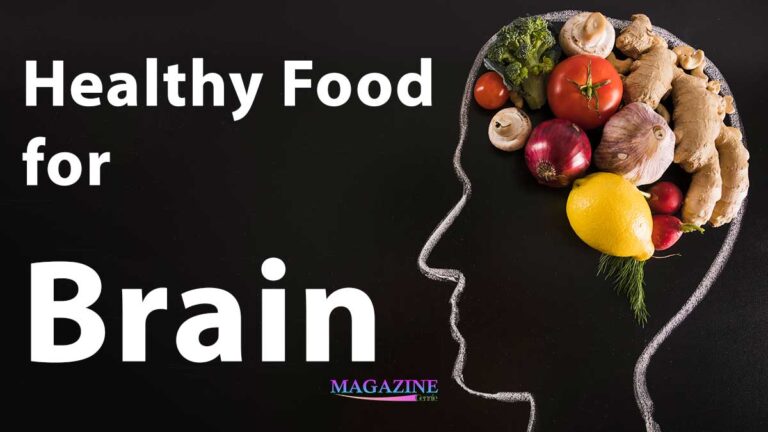Healthy Food for Brain: When it comes to our overall health and well-being, we often tend to focus on physical health, ignoring our brain’s health and cognitive capabilities. However, our brain needs nourishment and care to function correctly. Your diet can have a significant impact on your brain health, including cognitive function, memory, focus, and concentration.
A healthy diet that prioritizes brain health nutrition and cognitive function foods can help you avoid cognitive decline and enhance overall brain health. By including brain-healthy food in your diet, you can improve cognitive function and support an active and healthy brain.
Table of Contents
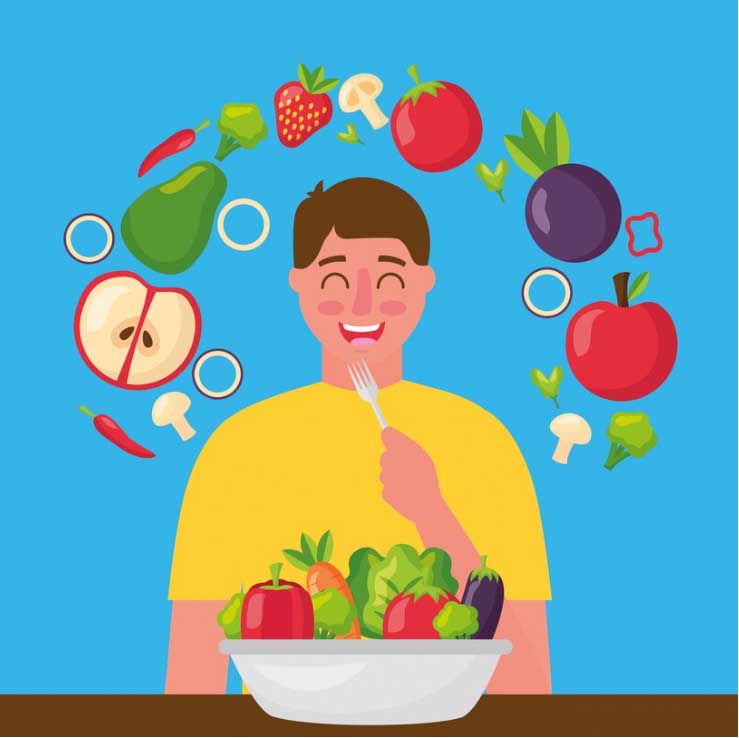
Key Takeaways
- Our brains need nourishment and care to function correctly.
- A healthy diet can help you avoid cognitive decline.
- Including brain-healthy food in your diet can improve cognitive function and support a healthy brain.
- Cognitive function foods are those that promote memory, focus, and concentration.
- A brain-healthy diet focuses on nutrient-rich food like whole grains, omega-3 fatty acids, and antioxidants.
The Link Between Food and Brain Health
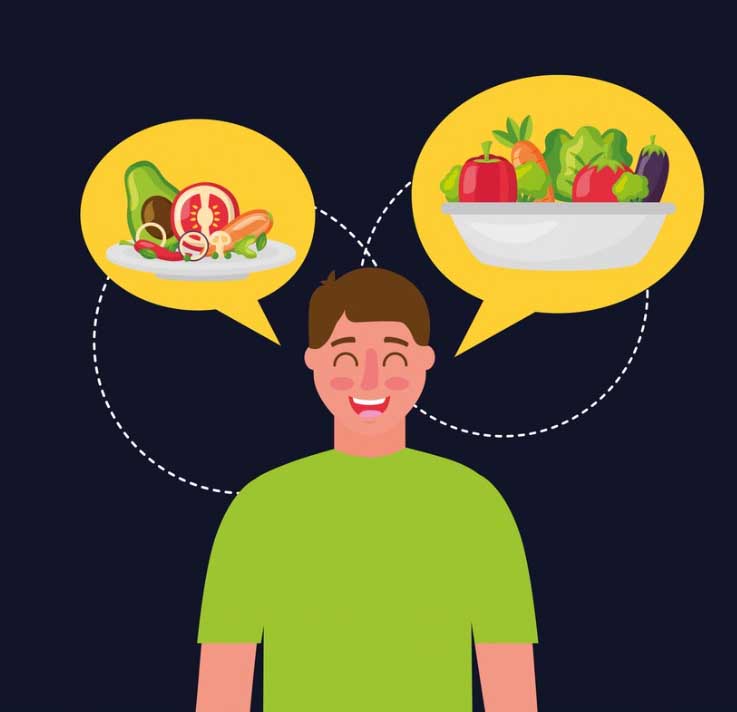
Have you ever wondered how the food you eat affects your brain health? As it turns out, the connection between food and brain health is crucial. Consuming brain-boosting foods can support cognitive health and nourish your mind for optimal brain function.
But what are brain-boosting foods, and how can they benefit cognitive health? These are the nourishing choices that can fuel your mind for optimal brain function. These foods are packed with nutrients that promote brain health, including:
- Foods for cognitive health: Avocado, blueberries, dark chocolate, and leafy greens.
- Brain-boosting foods: Fatty fish, nuts and seeds, and whole grains.
- Nourishment for brain health: Lean proteins, fruits, and vegetables.
Each of these food groups contains specific nutrients that support cognitive function, brain health and nourishment, making them essential components of a brain-healthy diet.
Stay tuned and read on to discover the specific nutrients and functions of these foods that can optimize brain health and cognitive function.
Nutrients for Improved Focus and Memory
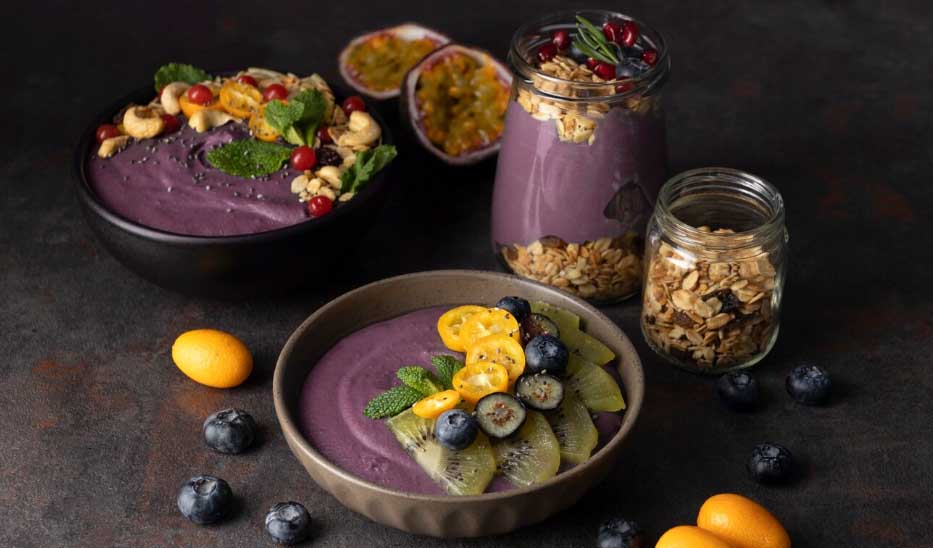
When it comes to enhancing focus and memory, certain nutrients are essential for optimal brain function. By incorporating these brain-boosting foods into your diet, you can improve mental clarity and memory function.
Foods for mental clarity:
- Blueberries
- Avocado
- Dark chocolate
- Green tea
- Leafy greens
Foods for memory enhancement:
- Fatty fish (such as salmon)
- Nuts and seeds
- Eggs
- Berries
- Whole grains
These specific foods are rich in nutrients such as antioxidants, omega-3 fatty acids, and B vitamins that promote optimal brain health and cognitive function. By incorporating a variety of brain-healthy foods into your diet, you can nourish your brain and improve your focus and memory.
Omega-3 Fatty Acids for Brain Health
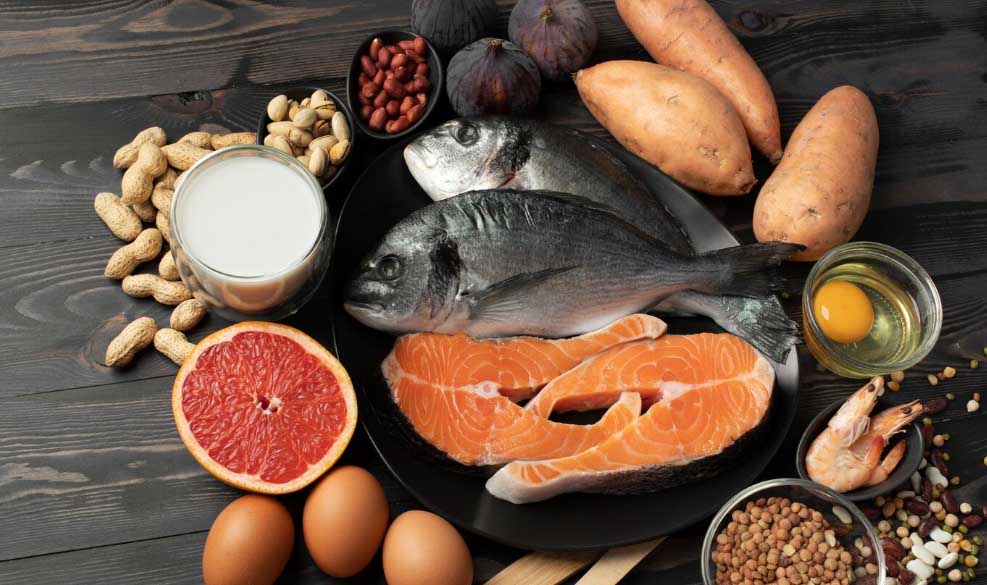
Omega-3 fatty acids are essential for brain health and cognitive function. These healthy fats have been shown to improve memory, decrease inflammation, and reduce the risk of age-related diseases such as dementia and Alzheimer’s.
The best dietary sources of omega-3s include fatty fish such as salmon, tuna, and sardines, as well as plant-based sources such as flaxseeds, chia seeds, and walnuts. Incorporating these foods into your diet can provide the necessary nutrients to nourish your brain and promote optimal brain health.
In fact, studies have shown that omega-3s can support cognitive function by improving focus, attention, and mood. This nutrient supports the brain’s structure and function, helping to maintain healthy brain cells and promoting communication between them.
Following a brain-healthy diet includes incorporating more omega-3 rich foods into your meals. Consider adding a serving of fatty fish to your weekly menu or sprinkling chia seeds on your morning oatmeal. Your brain will thank you!
Antioxidants and Brain Function
Antioxidants are essential in protecting the brain from damage by harmful molecules known as free radicals. They support cognitive function by preserving brain cells, which enhances learning, focus, and memory.
To enhance focus and concentration, consider incorporating antioxidant-rich foods into your diet, such as:
| Food | Antioxidant |
|---|---|
| Blueberries | Anthocyanin |
| Dark chocolate | Flavonoids |
| Spinach | Carotenoids, Vitamin C, and Vitamin E |
| Walnuts | Ellagitannins, Vitamin E, and Melatonin |
These antioxidant-rich foods can nourish your brain and improve overall brain health, leading to optimal cognitive function. Consider incorporating them into your diet today!
The Role of B Vitamins in Cognitive Health
B vitamins are essential for brain health and cognitive function. There are eight types of B vitamins, each playing a crucial role in brain function. Incorporating foods rich in B vitamins into your diet can boost cognitive function and improve overall brain health. Let’s explore the specific B vitamins and the foods that are rich in them.
| B Vitamin | Role in Brain Function | Food Sources |
|---|---|---|
| Vitamin B1 (Thiamine) | Helps brain cells produce energy | Beans, peas, nuts, pork, and whole grains |
| Vitamin B6 | Helps produce neurotransmitters that regulate mood and sleep | Poultry, fish, potatoes, chickpeas, and bananas |
| Vitamin B9 (Folate) | Helps create and repair cells, including brain cells | Dark leafy greens, beans, fortified cereals, and avocado |
| Vitamin B12 | Helps maintain healthy nerve cells and produce DNA | Meat, fish, dairy, and fortified cereals |
Incorporating brain-boosting foods rich in B vitamins into your diet can support cognitive function and promote overall brain health.
The Power of Whole Grains for Brain Health
Incorporating whole grains into your diet can significantly contribute to optimal brain health. Whole grains provide essential nutrients that can help boost cognitive function, improve memory, and maintain overall brain health.
Whole grains, such as brown rice, quinoa, oats, and whole-grain bread and pasta, are rich sources of fiber. Fiber aids in regulating blood sugar levels, reducing inflammation and oxidative stress, and maintaining healthy gut bacteria, which can positively impact brain function.
| Wholesome Grains | Benefits for Brain Health |
|---|---|
| Brown Rice | Rich in selenium, which supports brain function and mood regulation. |
| Quinoa | High in magnesium, an essential nutrient for brain health and cognitive function. |
| Oats | Rich in antioxidants and beta-glucan, a type of fiber that promotes healthy gut bacteria and reduces inflammation. |
| Whole-grain Bread and Pasta | Provide sustained energy and essential vitamins and minerals, such as B vitamins, iron, and zinc, for optimal brain function. |
Incorporating whole grains into your diet is a simple and delicious way to support brain health. Try swapping your refined grains with whole-grain versions for your favorite meals to reap the benefits of this brain-boosting food.
Importance of Hydration for Brain Function
Proper hydration is vital for optimal brain function and overall health. Staying hydrated can improve cognitive health and nourish your brain, promoting alertness and focus.
One of the most effective ways to stay hydrated is by drinking plenty of water throughout the day. Aim to drink at least eight cups of water daily and increase your intake during hot weather or exercise.
Other healthy drinks that can contribute to hydration and support brain function include herbal teas, green juices and smoothies, and coconut water. Try to limit your intake of sugary or caffeinated beverages, as they can lead to dehydration and impair cognitive function.
To ensure that you are staying adequately hydrated, monitor your urine color regularly. Pale yellow or clear urine typically indicates good hydration levels, while darker urine can indicate dehydration.
Stay hydrated and support your brain health by incorporating plenty of nourishing liquids into your diet. Your brain will thank you for it!
The Gut-Brain Connection
The gut-brain connection is an intricate mechanism that involves bidirectional communication between the gastrointestinal tract and the brain. It appears that gut health can have a profound impact on brain function, affecting everything from mood and memory to processing speed and attention. Research has shown that consuming brain-boosting foods can not only optimize gut health but also positively impact overall brain health and cognitive function.
Foods that Improve Gut Health
| Food | Nutrients |
|---|---|
| Yogurt | Probiotics |
| Kefir | Probiotics, prebiotics |
| Sauerkraut | Probiotics |
| Kimchi | Probiotics |
| Kombucha | Probiotics, antioxidants |
| Miso | Probiotics, antioxidants |
| Whole grains | Fiber, prebiotics |
| Fruits and vegetables | Fiber, prebiotics |
The above table features food that can improve gut health. Probiotics, found in foods like yogurt and sauerkraut, promote the growth of healthy gut bacteria. Prebiotics, found in whole grains and fruits and vegetables, feed gut bacteria, allowing them to thrive. A healthy gut can help protect brain cells and improve overall brain health.
Foods that Support Brain Health
Research has also shown that brain-boosting foods can improve gut health and support optimal brain function. Such foods include:
- Fatty fish like salmon and tuna, which are rich in omega-3 fatty acids
- Berries like blueberries and strawberries, which are high in antioxidants
- Nuts and seeds, which are a source of vitamin E and healthy fats
- Leafy greens like spinach and kale, which provide essential nutrients like folate and vitamin K
Incorporating these brain-boosting foods to your diet can help boost cognitive function and promote overall brain health. Optimize your mind and nourish your gut by enjoying a variety of brain-healthy foods.
Mindful Eating for Brain Health
When it comes to cognitive function, what we eat is just as important as how we eat. Mindful eating practices can significantly impact brain health by enhancing cognitive function and improving focus, memory, and concentration. So, how can you incorporate mindful eating into your routine?
To start, try to be present and fully engaged in the eating experience. Focus on the flavor, aroma, and texture of your food, and savor each bite. Avoid distractions such as smartphones or television during meals, and take the time to enjoy your food without rushing.
Another important aspect of mindful eating is listening to your body’s signals. Pay attention to feelings of hunger and fullness, and stop eating when you’re satisfied, rather than overeating. Take note of how certain foods make you feel physically and mentally, and adjust your diet accordingly.
By practicing mindful eating techniques, you can connect with your food and nourish your brain with the right nutrients for optimal cognitive function. Additionally, mindfulness can support a brain-healthy diet by promoting long-term healthy eating habits.
Exercise and Brain Health
Regular exercise not only benefits physical health but also has a positive impact on brain health. It promotes the growth of new brain cells and increases the connections between them, leading to improved cognitive function.
Studies have shown that a combination of aerobic exercise and strength training provides the greatest benefits for brain health. Aerobic exercise, such as running or cycling, increases blood flow to the brain and promotes the growth of new brain cells. Strength training, such as weightlifting, improves cognitive function by increasing brain-derived neurotrophic factor (BDNF), a protein that supports the growth and survival of brain cells.
Incorporating exercise into your daily routine can also improve mood and reduce stress, both of which are important for overall brain health. Aim for at least 30 minutes of moderate-intensity exercise, such as brisk walking or yoga, most days of the week.
By combining exercise with a brain-healthy diet rich in brain health nutrition and cognitive function foods, you can optimize your brain power and enhance your focus, memory, and concentration.
Best Food for Brain Recovery
When it comes to aiding brain recovery, certain foods are known to be beneficial due to their nutrients that support cognitive function and overall brain health. Here are some foods that are considered good for brain recovery:
- Fatty Fish: Rich in omega-3 fatty acids, particularly DHA (docosahexaenoic acid), fish like salmon, trout, and sardines can help reduce inflammation and support brain function.
- Blueberries: Packed with antioxidants, blueberries can help improve brain function and delay cognitive decline by protecting the brain from oxidative stress.
- Broccoli: This vegetable is high in antioxidants and compounds that have been linked to improved brain function. It’s rich in vitamin K, which is known for enhancing cognitive abilities.
- Pumpkin Seeds: These seeds are a great source of iron, zinc, magnesium, and copper, all of which are essential for brain health and function.
- Turmeric: Curcumin, the active ingredient in turmeric, has anti-inflammatory and antioxidant benefits, which can help support brain health and improve memory.
- Dark Chocolate: Dark chocolate contains flavonoids, caffeine, and antioxidants which can improve brain function, increase focus, and boost mood.
- Nuts: Nuts like almonds, walnuts, and hazelnuts are rich in omega-3 fatty acids, antioxidants, and vitamin E, all of which are beneficial for brain health.
- Eggs: Rich in choline, eggs support brain health and can help improve memory and cognitive function.
- Leafy Green Vegetables: Spinach, kale, and other leafy greens are high in vitamins and antioxidants, contributing to improved brain function.
- Avocados: Rich in healthy fats, avocados support healthy blood flow, which is essential for brain health, and they also contain antioxidants and potassium.
Incorporating a balanced diet that includes these brain-boosting foods, along with regular exercise, proper sleep, and hydration, can greatly aid in brain recovery and overall cognitive function. Additionally, it’s always recommended to consult with a healthcare professional for personalized advice regarding dietary needs for brain recovery or any health concerns.
Brain Food for Studying \ Brain-Boosting Foods for Students
Blueberries, Fatty Fish, Dark Chocolate, Nuts and Seeds, Avocados, Broccoli, Turmeric, Eggs, Whole Grains, Leafy Greens and Green
Bad Food for Brain
Some foods can have a negative impact on brain health and cognitive function. Consuming these foods excessively or regularly might not be beneficial for overall brain health:
- Processed Foods: Highly processed foods, including fast food, packaged snacks, and sugary treats, often contain high levels of unhealthy fats, sugars, and additives that can impair cognitive function over time.
- Trans Fats: Found in partially hydrogenated oils, trans fats are commonly present in fried foods, baked goods, and some margarines. They can increase inflammation and negatively affect brain health and memory.
- Sugary Foods and Beverages: High sugar intake, especially from sugary drinks and foods with added sugars, can lead to cognitive decline, impair memory, and negatively impact overall brain function.
- Highly Refined Carbohydrates: Foods made from refined grains like white bread, white rice, and pasta can cause rapid spikes and crashes in blood sugar levels, leading to reduced focus and energy.
- Excessive Alcohol: Heavy alcohol consumption can damage brain cells, impair cognitive function, and negatively affect memory and overall brain health.
- Sodas and Energy Drinks: These beverages often contain high amounts of sugar, caffeine, and artificial additives, which can lead to short-term spikes in energy followed by crashes, affecting focus and cognitive abilities.
- Highly Salted Foods: Excessive salt intake can lead to high blood pressure, which may negatively impact brain health over time by reducing cognitive function.
- Processed Meats: Some studies suggest that regularly consuming processed meats like bacon, sausage, and deli meats may contribute to cognitive decline due to their high saturated fat content and additives.
- Artificial Sweeteners: While controversial, some studies indicate that artificial sweeteners may disrupt healthy gut bacteria, potentially impacting brain health and cognitive function.
Limiting the intake of these foods and beverages and opting for a balanced diet rich in brain-boosting nutrients can contribute to better brain health and cognitive function over time. Incorporating a variety of fruits, vegetables, whole grains, lean proteins, and healthy fats is generally recommended for optimal brain health.
Healthy Food for Brain Stroke Patients
For individuals recovering from a stroke, maintaining a nutritious diet is crucial to support the healing process and overall brain health. Here are some healthy food recommendations that can benefit stroke patients:
- Fruits and Vegetables: Incorporate a variety of colorful fruits and vegetables rich in antioxidants and vitamins. Berries, oranges, leafy greens, carrots, and bell peppers are excellent choices as they provide essential nutrients for brain health and overall recovery.
- Fatty Fish: Include fish like salmon, mackerel, and trout that are high in omega-3 fatty acids. Omega-3s can reduce inflammation, support heart health, and aid in brain recovery post-stroke.
- Whole Grains: Opt for whole grains such as brown rice, quinoa, whole wheat bread, and oats. These grains provide fiber, vitamins, and minerals while helping regulate blood sugar levels and supporting heart health.
- Lean Proteins: Choose lean sources of protein like skinless poultry, legumes, beans, tofu, and nuts. Protein is essential for tissue repair and muscle strength during stroke recovery.
- Healthy Fats: Incorporate sources of healthy fats such as avocados, olive oil, nuts, and seeds. These fats support brain health, reduce inflammation, and aid in overall recovery.
- Low-Fat Dairy or Alternatives: Include low-fat dairy products like yogurt, milk, or dairy alternatives fortified with calcium and vitamin D for bone health and overall nutrition.
- Herbs and Spices: Use herbs and spices like turmeric, ginger, cinnamon, and garlic, which have anti-inflammatory properties and may benefit brain health.
- Hydration: Ensure adequate hydration by drinking plenty of water throughout the day. Dehydration can affect recovery and overall health.
- Limit Sodium and Processed Foods: Reduce the intake of processed foods, high-sodium items, and fast food, as excessive sodium can increase the risk of high blood pressure, which is a risk factor for strokes.
- Limit Saturated and Trans Fats: Minimize consumption of foods high in saturated and trans fats, such as fried foods, pastries, and fatty meats, as they can negatively impact heart health and recovery.
It’s important to consult with a healthcare professional or a registered dietitian for personalized dietary recommendations tailored to individual needs and medical conditions. A balanced and nutritious diet, combined with appropriate medical care and rehabilitation, plays a significant role in aiding stroke recovery and promoting overall well-being.
Healthy Food for Brain Tumor Patient
For individuals undergoing treatment for a brain tumor, maintaining a healthy diet is essential to support overall health and potentially aid in recovery. Here are some recommendations for a healthy diet:
- Nutrient-Dense Foods: Focus on whole, nutrient-dense foods like fruits, vegetables, whole grains, lean proteins (such as chicken, fish, tofu), and healthy fats (like avocados, nuts, seeds, and olive oil). These foods provide essential vitamins, minerals, and antioxidants important for overall health.
- Antioxidant-Rich Foods: Antioxidants help protect cells from damage caused by free radicals. Include berries (blueberries, strawberries, raspberries), leafy greens (spinach, kale), colorful fruits and vegetables (tomatoes, bell peppers, carrots), and nuts in your diet.
- Omega-3 Fatty Acids: Incorporate sources of omega-3 fatty acids, such as fatty fish (salmon, mackerel, sardines), flaxseeds, chia seeds, and walnuts. Omega-3s have anti-inflammatory properties and may benefit brain health.
- Healthy Hydration: Stay well-hydrated by drinking plenty of water throughout the day. Herbal teas and infused water can add variety while keeping you hydrated.
- Moderate Caffeine Intake: Limit excessive caffeine intake, as it might interfere with sleep and hydration. Opt for moderate amounts from sources like tea or coffee if desired.
- Fiber-Rich Foods: Whole grains, legumes, fruits, and vegetables are excellent sources of dietary fiber, which aids in digestion and supports overall health.
- Limit Processed Foods and Added Sugars: Minimize the consumption of processed foods, sugary snacks, and high-sugar beverages, as they offer little nutritional value and can contribute to inflammation.
- Small, Frequent Meals: Eating smaller, frequent meals throughout the day may help manage energy levels and prevent feelings of fatigue or nausea, which can be common during treatment.
- Consult a Registered Dietitian: Individual nutritional needs can vary based on treatment, medications, and overall health status. Consulting with a registered dietitian who specializes in oncology nutrition can provide personalized guidance.
Remember, while a healthy diet is important, it’s equally crucial to consult with healthcare professionals, including oncologists and dietitians, to tailor a nutrition plan that best suits the specific needs and tolerances of the individual undergoing treatment for a brain tumor.
Conclusion
Nourishing your brain with healthy food is essential for cognitive function and overall brain health. By incorporating brain-boosting foods into your diet and following a brain-healthy eating plan, you can optimize your brain power and enhance your focus, memory, and concentration. Start fueling your mind with the right nutrition for a healthier brain today.
Remember that a brain-healthy diet includes a variety of brain-boosting foods, such as omega-3 fatty acids, whole grains, and antioxidant-rich fruits and vegetables. Additionally, staying hydrated and practicing mindful eating can positively impact brain function.
Regular exercise also plays a vital role in maintaining brain health, so add physical activity to your routine to support cognitive function.
With a conscious effort to prioritize Healthy Food for Brain, you can fuel your body with the right nutrients to support optimal brain function and improve overall quality of life
FAQ
1. What is the connection between food and brain health?
The food we eat plays a crucial role in our brain health. Consuming brain-boosting foods can support cognitive health and nourish our brain for optimal function.
2. What are some brain-boosting foods for cognitive health?
There are several foods that are known to enhance cognitive health. These include blueberries, fatty fish like salmon, turmeric, broccoli, pumpkin seeds, and dark chocolate.
3. How can certain nutrients improve focus and memory?
Certain nutrients, such as antioxidants and omega-3 fatty acids, have been shown to enhance focus and memory. Incorporating foods rich in these nutrients, like leafy greens and walnuts, can support mental clarity and memory enhancement.
4. Why are omega-3 fatty acids important for brain health?
Omega-3 fatty acids are essential for brain health and cognitive function. They play a vital role in the structure and function of brain cells. Fatty fish, flaxseeds, and chia seeds are excellent sources of omega-3s.
5. How do antioxidants support brain function?
Antioxidants protect brain cells from damage caused by free radicals and inflammation, thus supporting brain function. Foods rich in antioxidants include berries, dark leafy greens, and colorful vegetables.
6. What role do B vitamins play in cognitive health?
B vitamins, such as B6, B12, and folate, are crucial for proper brain function and cognitive health. They support the production of neurotransmitters and help maintain healthy brain cells. Foods like spinach, eggs, and lentils are excellent sources of B vitamins.
7. How can whole grains benefit brain health?
Whole grains provide essential nutrients and energy for optimal brain health. They contain fiber, vitamins, and minerals that support brain function and help maintain steady energy levels. Incorporating whole grains like oatmeal and quinoa into your diet can promote a brain-healthy diet.
8. Why is hydration important for brain function?
Staying hydrated is crucial for optimal brain function. Dehydration can impair cognitive abilities and affect mental clarity. Drinking enough water throughout the day supports brain health and cognitive function.
9. How does the gut-brain connection impact brain health?
The gut-brain connection refers to the bidirectional communication between the gut and the brain. Certain foods, like fermented foods and those rich in fiber, can promote a healthy gut and positively impact brain function. Nourishing your gut with brain-boosting foods can improve overall brain health.
10. How does mindful eating contribute to brain health?
Mindful eating practices, such as being present and savoring each bite, can positively impact brain health. It helps cultivate a healthy relationship with food and encourages a brain-healthy diet. Mindful eating promotes better digestion and absorption of nutrients, supporting cognitive function.
11. What is the connection between exercise and brain health?
Regular exercise has been shown to improve brain health and enhance cognitive function. Engaging in physical activity increases blood flow to the brain, promotes neuroplasticity, and supports the growth of new brain cells. Aerobic exercises like jogging and swimming are particularly beneficial for brain health.
12. Why is nourishing the brain with healthy food important?
Nourishing the brain with healthy food is essential for optimal cognitive function and overall brain health. By incorporating brain-boosting foods into your diet and following a brain-healthy eating plan, you can enhance focus, memory, and concentration, and support your brain’s long-term health.

